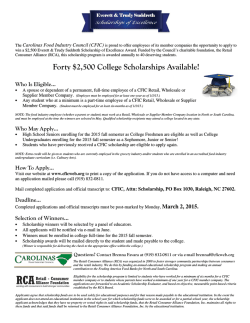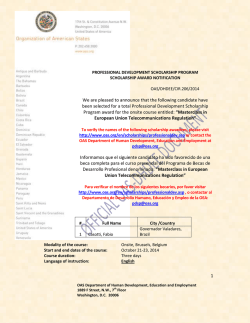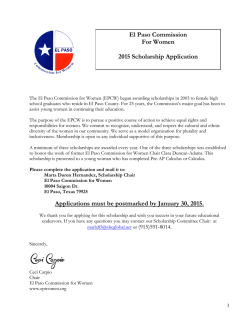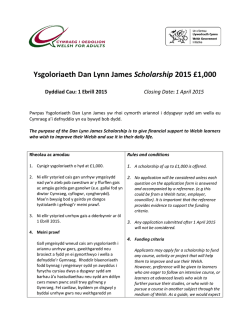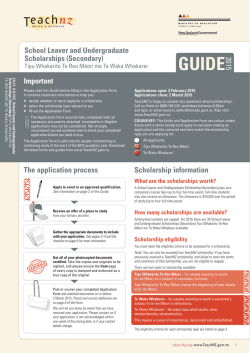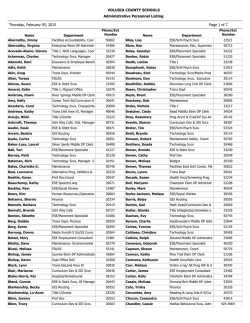
Winter 2014-15 Parent Newsletter
ESE Parent Newsletter The School District of Clay County Winter 2014-15 20th Annual Tools for Success Conference February 26, 2015 8:00 a.m. - 3:15 p.m. This conference is for and about families of children with special needs ages birth to 22. Location: University of North Florida UNF-Adam W. Herbert University Center Alumni Drive, Jacksonville For More Information: Contact FDLRS/Crown 904-346-4601 ext. 119 There will be multiple breakout sessions on a variety of topics relating to children with special needs. This event is FREE!! The School District of Clay County Winter 2014-15 Page 2 TOPSOCCER Did you know Clay County Soccer Club offers TOPSoccer? TOPSoccer (The Outreach Program for Soccer) is a community based soccer program that is designed to meet the needs of children with physical and/or cognitive disabilities. Player participation and development are key elements of the program as players are placed on teams according to ability and NOT by age. TOPSoccer is designed to improve the overall fitness, self esteem, and social skils of your child. The Clay County Soccer Club is offering TOPSoccer in our community and is providing a professional staff to assist with conducting each session along with other area volunteers. It is fully supported by the Florida Youth Soccer Association (FYSA) and US Youth Soccer TOPSoccer. Clay County Soccer is pleased to offer that program at no cost to all participants and volunteers. We will be providing a uniform jersey to all of our players. Players from age 4 and up are welcome to participate. Please register at our website: http://www.claycountysoccer.com/topsoccer Please share this information with family and friends that may be interested in TOPSoccer. TOPSoccer is a great way to get some exercise, meet new people, and have a great time! For questions or to volunteer or for additional information, please contact Matt Hollyoak, TOPSoccer Coordinator. Phone: 904-316-5950 Email: [email protected] The School District of Clay County Winter 2014-15 Page 3 Eight Steps to Better IEP Meetings 1. Make every attempt to sustain relationships We cannot lead a team we do not join. We must model the behavior we want to draw out of our children’s IEP team. 2. Keep the focus on the child’s needs, not the district’s resources or the parents’ expectations. Use evaluation data: Get the child tested. Know where you are beginning. Design specific, measurable, realistic IEP goals: Avoid generalized goals. Parental expectations vs. district resources: In negotiations, emotions are often the problems to be solved. Parents should never treat the school team as if they have limitless resources and school personnel should never forget the legitimate emotional investment each parent has in his or her student. 3. Always provide “face saving” ways out of a dilemma. Have a back up plan. Special needs children benefit greatly from principled negotiations. When parties know what their needs are, they can be more creative in finding solutions to those needs. 4. Build your record If you feel your child is not making progress, be prepared to show, objectively, how your child is not meeting his goals. Produce reports, articles or test results that will persuade the listener why your suggestions are reasonable. Parents must be willing to face the reality of their child’s abilities! 5. Walk a mile in the other side’s moccasins It will not hurt to indulge your thoughts about how things are for the other side. Spend time in the classroom, watch the kids on the playground and in the lunchroom. What really goes on inside the school? How tired must the teachers, the aides, and your child be? 6. Listen actively, especially to the things you do not want to hear No one is all knowing. Really. As much as I know about my child, and I know an awful lot, I still have things to learn. Hear them. Listen to everything with a whole heart and a whole head. 7. Encourage everyone to love your child, then let them! Let them close to your child to see the wonders and beauty you do. When they learn to love your child from their heart, they will be motivated to do what they can to help and will listen to what you have to say. 8. Have a little faith. Generally, give your child’s team some credit for acting in good faith. If they need education, supply it. If you disagree, try to work it out. Do not demonize well-intentioned people. Utilize them. Even if they have priorities that you cannot share, they can turn out to be of great help to your child. (Courtesy of Wrightslaw, Issue: 455, September 30, 2008) The School District of Clay County Winter 2014-15 Page 4 ESE Parent Workshop Schedule Feb. 10, 2015 All About Behavior Plans Speaker: Travis Henderson Board Certified Behavior Analyst Feb. 17, 2015 Parent Advisory Council All parents are encouraged to attend! Speaker: Terry Roth ESE Director Mar. 10, 2015 Classroom Strategies for Students with ADD/ADHD Speaker: Illisa Hamilton Apr. 14, 2015 ESE Parent Support Group Jill McElyea Apr. 21, 2015 Make & Take Picture Communication Boards Bruce Glendenning of FDLRS All ESE parent workshops are held in the Meeting Room of the Fleming Island Headquarters Library from 6:30 p.m. - 8 p.m. All parents are encouraged to attend. For more information: Contact Jill R. McElyea at 626-5204 or email [email protected] All parents are encouraged to attend and children are welcome although no child care is available. Parent Notification of McKay Scholarship We would like to inform you that your child may be eligible to participate in the John M. McKay Scholarships for Students with Disabilities Program, commonly known as the McKay Scholarship Program. This program was created to provide educational options to parents of disabled students. Currently, more than 19,000 Florida students are participating in this program. By participating in the McKay Scholarship Program, your student may be able to attend a different public school in your district, attend a public school in an adjacent district, or receive a scholarship to attend a participating private school. In order to be eligible for the McKay Scholarship Program, a student must apply for the program prior to withdrawing from public school. The student must have an Individual Education Plan (IEP), and: Have been enrolled and reported for funding in a Florida public school for the school year prior to applying for a scholarship (Grades K-12); or Have been a pre-kindergarten student who was enrolled and reported for funding in a Florida public school during the school year prior to applying for a scholarship; or Have attended the Florida School for the Deaf and the Blind during the preceding school year’s student membership surveys (Grades K-12). To find out if your student is eligible, you may apply for the McKay Scholarship on the School Choice Website at www.floridaschoolchoice.org. Select the McKay Scholarships link and then the link titled Apply for a McKay Scholarship on the menu bar on the left. To learn more about your child’s educational options, please contact your school district’s Parental Choice Office. You may also contact the Department of Education, Office of Independent Education and Parental Choice Information Hotline at 1 (800) 447-1636 or visit the School Choice Website at www.floridaschoolchoice.org and click the McKay Scholarships link. In order for a student to be eligible for the program, intent to participate in the McKay Scholarship Program must be filed on the School Choice Website prior to withdrawing from public school. The deadline to apply for the first payment period of the 2014-15 school year is July 3, 2014. Please note this letter serves to notify you that your child may be eligible to participate in the McKay Scholarship Program. This letter does not guarantee your student’s eligibility.
© Copyright 2026
